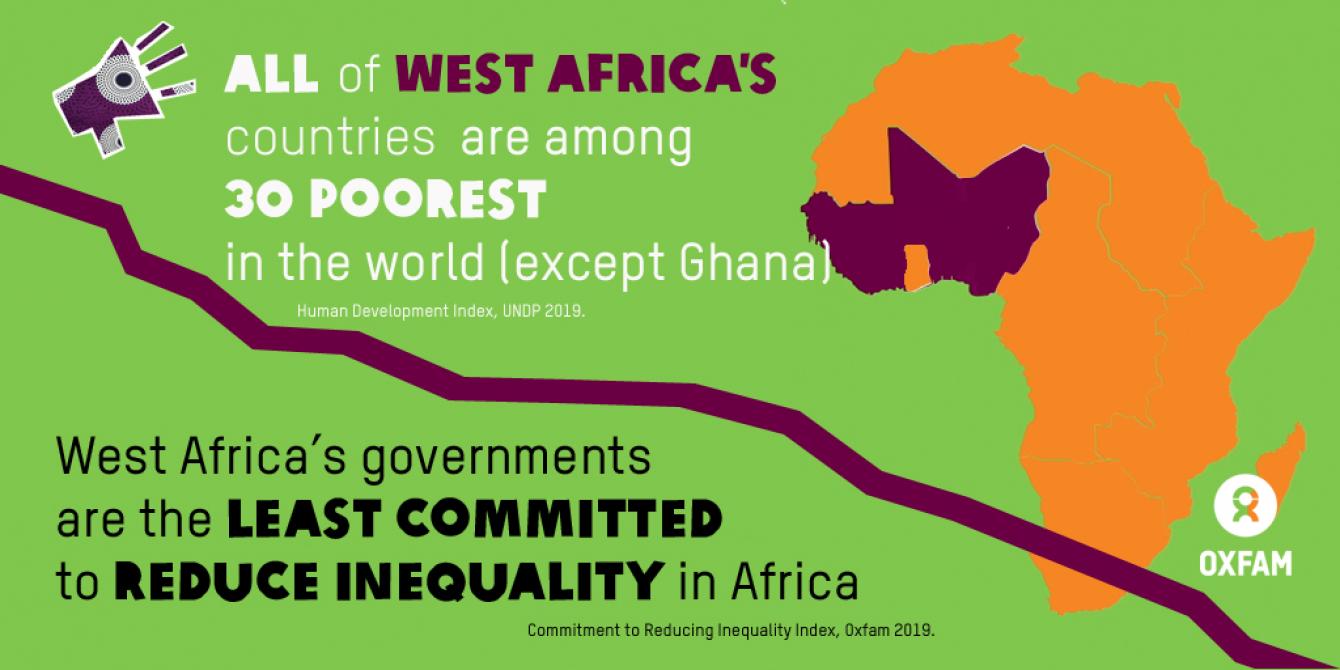West African countries lag the world in fighting inequality – 2019 UN report

West African countries lag the world in fighting inequality – 2019 UN report
December 9, 2019 – All West African countries, with exception of Ghana, are among the 30 poorest countries in the world, according to the latest Human Development Report (HDR) which this year focuses on inequality.
Four of these countries are among the bottom ten – Burkina Faso, Mali, Niger and Sierra Leone. Governments in the ECOWAS region are also the least committed to fighting inequality in Africa, based on the Commitment to Reducing Inequality (CRI) index, published in July 2019 as part of the regional report The West Africa Inequality Crisis by Oxfam and Development Finance International (DFI).
“The HDR 2019 findings further confirm that West African governments are fuelling inequality by underfunding public services, such as healthcare and education and failing to clamp down on tax evasion, tax avoidance and political capture. This is unacceptable,” said Adama Coulibaly, Regional Director of Oxfam in West Africa.
Just as the regional report of Oxfam/DFI, the 2019 HDR also underscores that power imbalances are at the centre of many inequalities. To comprehensively fight inequality, the HDR challenges governments to pursue policies that tackle the underlying drivers of inequality.
“There is nothing inevitable about the inequality crisis in the West Africa region, and without radically increasing the commitment to reduce inequality, the crisis is likely to only worsen, says Kwesi Obeng, Oxfam’s Programme Advisor Inequality in West Africa. “As an example, revenues from sovereign resources exploited by the extractive industries and a fair and optimal taxation system are critical to putting an end to extreme inequalities in the region,” he added.
As the poorest continent, Africa is also one of the most unequal, with some of the most extreme divides between rich and poor, between men and women in the world. But crucially, this is reversible: “It’s time for West African governments to act decisively. To strengthen this commitment, West African governments must promote progressive taxation, boost social spending, strengthen labour market protection, invest in agriculture and strengthen land rights for smallholder farmers. We cannot beat poverty without fighting inequality.” said Coulibaly, Regional Director of Oxfam in West Africa.
END
According to Oxfam/DFI Commitment to Reducing Inequality index:
- The three most committed West African countries to reducing inequalities are Cape Verde, Mauritania and Senegal. The three least committed are Nigeria, Sierra Leone and Niger.
- ECOWAS countries lose an estimated $9.6 billion to corporate tax incentives offered to multinational companies. This would be enough to build about 100 modern and well-equipped hospitals each year in the region or seven brand new hospitals per country in one year.
- Burkina Faso is the only West African country among the top ten most committed to social spending in Africa. The West Africa region has the least population with access to water and decent education in Africa. Nigeria has the worst score on social spending, not only in Africa but in the world.
- West Africa’s universal health coverage is the lowest of all sub-regions of Africa.
- The average universal health coverage in the ECOWAS region is 38%. It is 47.2% in Eastern Africa and 50.2% in Southern Africa.
- If all 15-year-olds achieved a basic level of education, the West Africa region could increase its economic growth by nearly 4%.
- Inequalities between rural and urban populations are particularly noticeable in West Africa. For example, in Ghana, 62.3% of urban households have access to treated water but just 17.1% of rural households and 88.6 per cent of the urban population are connected to the national grid, compared with 48.3 per cent of the rural population.
- Five of Nigeria’s richest men have a combined wealth of US$29.9 billion – more than the country’s entire national budget for 2017. However, about 60 per cent of its citizens live on less than US$1.25 a day, the threshold for absolute poverty.
- West Africa is the most male-dominated region in Africa in terms of participation in the labour market. The gap is widest in Mauritania where only 31% of women of working age compared to 67.7% of men are in paid work. In Benin, it is 45.5% female and 69.9% male. Ghana’s labour market is the most inclusive in the sub-region with 74.8% women, 79.2% men.
- There are widespread labour rights violations across West Africa. The informal sector is the main source of employment. Informal workers, mostly women, live in precarious conditions, are poorly paid, sometimes far below the poverty line. For example, in Senegal, only 3.8 per cent of jobs are in the formal sector.
- 35% of West Africa’s economy is agriculture, employing over 50 per cent of the workforce, especially women. Despite this, most West African governments fail to honour the Malabo commitments to invest 10 per cent of their national budget in agriculture.
The report, methodology document explaining how Oxfam calculated the figures, and the data set are available on request.
Oxfam’s calculations are based on the most up to date, comprehensive data sources available

 Suivez-nous sur Facebook
Suivez-nous sur Facebook Nos vidéos sur YouTube
Nos vidéos sur YouTube Suivez-nous sur Twitter
Suivez-nous sur Twitter